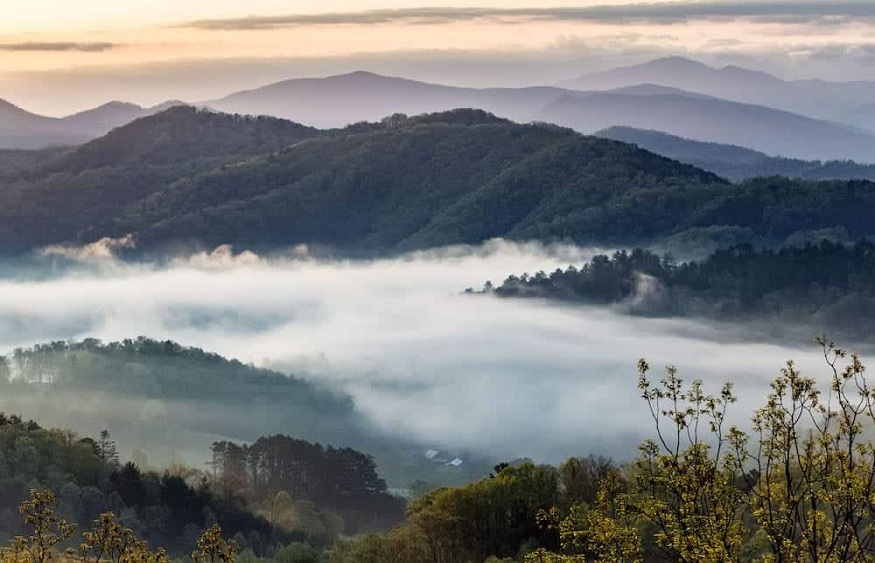This week, members of the Cherokee Indian’s Eastern Band may be picking sochan for their dinners in the Great Smoky Mountains National Park for the very first time in the 85-year history of the park.
The right to be able to harvest sochan – which is a bitter spring green that is an important component of the traditional Cherokee diet and culture – comes following a historic agreement that was signed on March 25 by Richard Sneed, the Cherokee Principal Chief, and Cassius Cash, the Smokies Superintendent, at the Oconaluftee Visitor Center.
It returns to the Cherokee the right to pick and cook sochan on their ancestral land which they have been doing for thousands of years. Sochan is similar to kale and also referred to as green-headed coneflower.
Cash said it is a historic day. We are one of the very first parks to do this, and the Cherokee is the first tribal nation that has completed the process since August 2016 when the new plant gathering rule was initially published.
National parks prohibit picking plants
Since 1916 when the national parks were first established, picking of any plant parts or plants has been prohibited by all national parks, including the Blue Ridge Parkway and the Smokies. In 2015 a new plant gathering rule was passed to relax the ban and allowed enrolled members of Indian tribes that are federally recognized to petition to have the right to harvest plans for cultural, traditional tribal purposes, as long as harvesting doesn’t cause an adverse and significant impact on park resources.
An environmental assessment was released by the National Park Service, following a public comment period that was held last fall. A Finding of No Significant Impact report was issued on February 27, which allowed for a permit-based system to harvest sochan in specific areas only out of the half=million-acre, heavily forested and mountainous park on the Tennessee-North Carolina border.
The FONSI report addressed comments including the concern that sochan might be overharvested, and that would lead to the sensitive plants being trampled and would impact the wetland areas negatively where sochan grows.
The FONSI reports that up to 25 enrolled members of the Eastern Band will be allowed to have a permit each year. It must be carried with them while gathering sochan. The size of groups is limited to six individuals to minimize the damage of resources caused by trampling.
Based on traditional practice, permit holders will be authorized to collect what the Cherokee refer to as the perennial plant’s “turkey foot.” The turkey foot is comprised of the sochan leaf’s three-terminal lobes, which range from 3 to 5 inches in length. Larger and smaller leaves are not allowed to be harvested.
Permit holders are allowed to collect up to 1 bushel (35.2 liters) of sochan leaves per week, only using official bags that the Smokies have approved to collect sochan and transport it within the park.
March 1 through May 31 is the gathering season for sochan. A training session was planned for March 25, including regulations, harvesting methods, how to engage with the public when someone sees people harvesting, and where harvesting is not allowed, including wet areas.
After completing the training, members could then apply with the EBCI for a permit. Cash said the permit could be issued as soon as this week.
All gatherings would remain out of areas like picnic areas, campgrounds, trailheads, parking lots, major roads, and visitor centers and also would not be allowed in wet areas or Purchase Knob research areas. He said they would be setting up sochan monitoring plots and permit holders will be required to provide the coordinates for where they are harvesting. Cash added that they will be able to see if science-based sustainability is actually occurring.
If a decrease occurs, the park will stay flexible in terms of when and how the harvesting will continue. Also, the plots will be monitoring for any trampling.
The Eastern Band and the National Park Secie also will be jointly administering a traditional gathering program for monitoring resource impacts, sochan gathering quantity, and program participation. A sochan gathering report must be submitted by permit holders every week to the EBCI Natural Resouces Department, and the reports will then be reported to the Smokies.
Tommy Cabe, a tribal forest resource specialist previously told the Citizen-Times that institutional ecological knowledge would be used by the tribe to harvest plants in a sustainable manner. He added that we belonged to the park landscape in the past. Some of the places where we collect are not just about gathering there since it grows there, but it is also a spiritual site and a family tradition.
It is a good thing having a rule that allows for the culture to reconnect with the land. It has been a very long but deliberate and thoughtful process. However, it is very science-based as well. It allows for a good balance to be struck between honoring the culture and tradition of the Cherokee Eastern Band while still allowing for the preservation of sochan for generations into the future.

